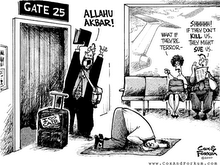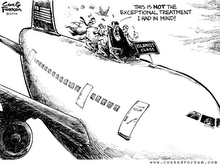Davie It is politics, not Islam, that has driven suicide bombers to strike with increasing frequency in recent years, a specialist on international security said Saturday.
And nowhere is this grim phenomenon more apparent than Iraq, which led the world in the number of suicide attacks (350) from 2004 through 2006 after the U.S.-led invasion in 2003, said Robert Pape, a political science professor at the University of Chicago.
Speaking at an afternoon symposium on "Islamophobia," Pape told a mostly receptive audience that "the main cause of suicide terrorism is the presence of U.S. and Western combat forces on the Arabian Peninsula."
The symposium, attended by about 150 people, was organized by the Florida chapter of the Council on American-Islamic Relations and the International Muslim Association at Nova Southeastern University.
As director of the Chicago Project on Suicide Terrorism, Pape and other researchers have created a database tracking suicide attacks as they relate to geopolitical developments. Pape said while just three suicide attacks occurred each year in the 1980s, the deployment of U.S. and other Western military forces to the Middle East has fomented resentment and caused suicide bombings to jump to about 50 annually by 2002.
"Since 9-11, the pattern of attacks shows that victims are consistently Western civilians that have forces in Iraq and Afghanistan," Pape said. He predicted that as long as U.S. forces remain in Iraq, Al-Qaida could continue to recruit suicide attackers.
Pape likened the discrimination experienced by some American Muslims to the internment of Japanese Americans in World War II. He did not elaborate.
Another panelist, Mohamed Nimer, a CAIR research director in Washington, D.C., argued that Islamophobia is on the rise.
Nimer urged tolerance and underscored the importance of "dialogue to expose myths and increase understanding of one another."
Some critics have accused CAIR of advocating extreme Islamist goals and serving as apologists for terrorism. The organization's leaders say their critics are trying to fan anti-Muslim hatred.
Aisha Musa, assistant professor of Islamic Studies at Florida International University's religious studies department, blamed the mass media for fueling misconceptions about the tenets of the Muslim faith.
"Does the Quran talk about violence?" Musa said. "Yes, it does. But there are disagreements over when it is justified."
Sunday, July 1, 2007
Our fault, Again
Subscribe to:
Post Comments (Atom)









No comments:
Post a Comment